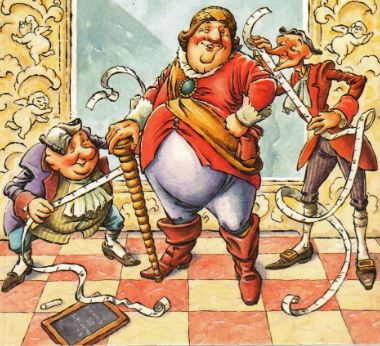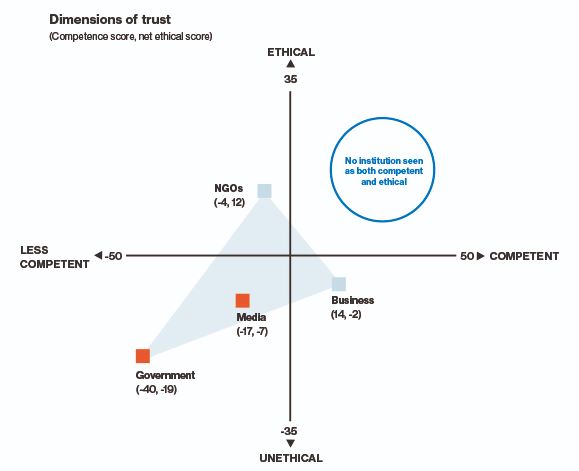
We’re back in speech season! This is my favorite time when public figures regardless of political backgrounds come on stage to face the nation during presidential nomination conventions. Joe Biden’s acceptance speech left a mark on me when he said the country underwent four concurrent crises—the covid pandemic, economic slowdown, anti-racism movement, and climate change. I’d add the fifth crisis—the trust crisis.
I’ve expressed my view on trust in previous posts—“Let’s Talk About Trust (two series),” so I’ll spare you from my litany. Before the pandemic, the 2020 Edelman Trust Barometer revealed that despite a strong global economy and near full employment, none of the four societal institutions—government, business, NGOs, media—is trusted. A growing sense of inequity is undermining trust, said the report. In comparison of competence and ethics which are two distinct attributes of trust, none of the four institutions is seen as both competent and ethical. Government does even worse than media in spite of the fact that both are perceived as incompetent and unethical. Now I have some inklings about why my frustration in what I’m about to share with you stems from incompetent leaders. Earlier this month, I was asked to share my view of the anti-racism movement. Out came the following essay. It takes time to build trust, let alone rebuilding trust that was lost by malicious rhetoric, deception, and bullying. Only if we could reimagine a crisis and commit to our good deeds by action rather than words in the context of others, perhaps time will give us a second chance to trust someone again. Whatayathink?

Here is the essay:
Having lived in China for a good number of years, I’m very familiar with what an ordinary life under an authoritarian power is like. What pains me is this year I saw how this authoritarian style of governing has infected rank and file like a virus among leadership in the United States, and how abuse of power and disinformation have torn apart every facet of our democracy. The devastation is impactful both at home and abroad, both personal and collective. The covid pandemic has turned a spotlight on the broken systems—from supply chains and public health to job security and environmental justice—at which we would normally keep a blind eye. The all-too-familiar anguish of racism in not only an American problem—and yet the most typical interpretation of Americanism—it’s also a global problem. Racism has plagued humanity for centuries. If we look back the history, it found roots associating with prejudice and bias. The most prominent form of racism on display includes Shakespeare’s dramas, Othello with its comment on color, and The Merchant of Venice with its anti-Semitism theme. These past months I’ve delved into history of the Anthropocene while contemporary history is unfolding before my eyes. Against the backdrop of a sluggish economy with business as usual (as opposed to thriving e-commerce), humanity is struggling to move forward like James Baldwin’s proverbial “people trapped in history.”
Among many core values that I hold, trust is the most violated in the world right now. On more than one occasion during my sustainability study, I’m asked how I would influence others on climate adaptation. The more I listen to different experts as well as ordinary people about their perspectives of climate change, the more I realize this is more of a communication problem. It’s more than what we say but how we say it and who says it to the audience—they matter. To prevent covid, wearing a mask or not is a trust problem. Reopening business and school is a trust problem. Even in the subject of race and racism, minorities may find more trust in their clergymen than in Dr. Fauci. White cops lost trust among black folks. First-generation immigrants mingle with their own ethnic group based on trust. I notice that African American journalists are often assigned to interview people of their same color, the same with other ethnic reporters. Is it a bias-based management decision? Or is it an assurance tactic for the interviewee to wear her heart on her sleeve before the person who looks like her?
The most uncomfortable truth is we are living in a country led by apathetic liars. Because of disinformation by public figures, oftentimes those who hold important roles, the American public is becoming ever more polarized, at some point, even backward. In systems thinking, the idea of white supremacy is in a reinforcing feedback loop, gaining momentum from these liar leaders. The public may not trust a public officer, the person per se, but their titles are supposed to be authoritative. Who would question the nation’s top health organization? But in this day and age, misinformed citizens do cast doubt and even dismiss CDC guidelines. Sadly, we have many embarrassing American leaders right now on active duty.
Whether it is in the battle of covid or of mitigating climate change, we cannot live in Hans Christian Andersen’s fairy tale, The Emperor’s New Clothes. I continue to speak out through my writing in hope to give voice to the voiceless. It may not change much but there is at least one voice on this planet to tell the world: “[The emperor] He’s wearing nothing!” If we don’t resist falsehood and translate climate science into action, the price of loss will be too costly. The covid pandemic is a real-life lesson from history.
In view of climate mitigation and adaptation under incumbent administration, the United States will be left behind while other countries are taking action bound by the Paris Agreement. I don’t think the silent majority in America will be silent on this decision. Reading “the SDSN Statement on Racial Inequality” and alike by executives of different organizations and institutions reaffirm my belief that we have good role models of leadership in this country. We also have young generations who are more conscious about social and environmental injustice than ever. Joining them together in the field of sustainability, I’m energized by like-minded global citizens and leaders who rise to the occasion to provide expertise, insight and hope.
